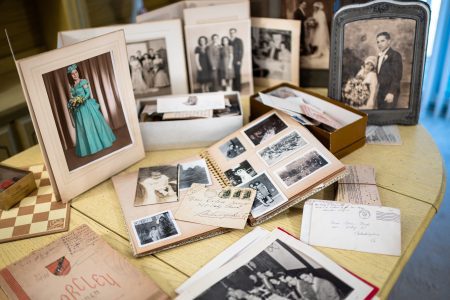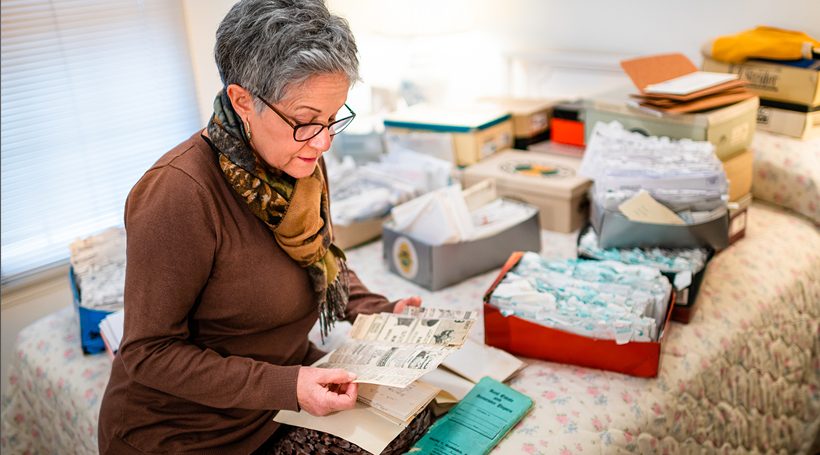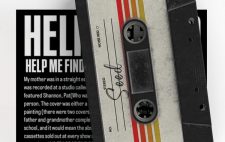Photos: David Michael Howarth
Jean Bogen was meticulous, that much was apparent. When Claudia Renzi walked into Bogen’s South Philly house, it was almost exactly as she remembered it being the last time she was there 15 years ago. Like, exactly.
Renzi drove from Moorestown to this 3-story house after discovering her husband had been named executor of Bogen’s will. It was quite a surprise, because they hadn’t been in contact with the aunt since that last visit. But that first surprise was nothing compared to how she felt when she opened the door to the home.
The furniture, immaculately covered in plastic, looked like it had never been sat on, used or touched. Every room was neat and tidy, every surface spotlessly clean. Stacks of years worth of mail – wedding invitations, birthday cards, bank statements and junk mail – were her only warning to what she’d find over the next 2 weeks as she unraveled the house room by room, drawer by drawer.
Bogen was 95 years old when she passed away last month. She had no kids, and her husband had passed away with dementia 8 years ago. She was Renzi’s distant relative, her mother-in-law’s first cousin. Renzi’s husband was the only option for the executor of her will. Bogen, it seems, didn’t have anyone she was close to.
“Jeannie and Leon kept to themselves,” says Renzi. “It seems like they socialized when they were younger, but later in life I don’t think they had friends, and they didn’t do much with the family. She didn’t entertain, so no one knew how she lived.”
As luck would have it, Renzi had 2 weeks off before starting a job as a hairstylist. That gave her time to sift through Bogen’s entire life – the good, the bad, the beautiful, the trash. Every detail was meticulously documented by Bogen before her death.
From the looks of it, Bogen kept everything that came into the house. It was “meticulous, immaculate, organized hoarding,” says Renzi. From what Renzi could see, Bogen bought items in bulk – 10s, 20s, 30s of everything. She had a whole cabinet full of canned goods dating back to 2000. Her cabinets held 25 tubes of toothpaste, all labeled with the date she bought them, 25 bottles of Johnson’s baby shampoo, dated and logged, and hundreds of bobby pins. In the TV console drawers were every movie or TV show Bogen and her husband ever watched, carefully labeled and accompanied by a binder detailing what they watched and when.
“I opened the closet, and there were duplicates of everything,” says Renzi. “50 pairs of black leggings, 50 pairs of grey trousers, 30 little black skirts, shirts of every color. She had dozens of pairs of shoes, all in perfect condition because she never left the house. There was a closet filled entirely with just white coats. And the makeup – so, so much makeup.”
A South Philadelphia Italian woman, Bogen’s makeup drawers had no equal. There were 25 packages of Maybelline black eyeliner, 20 Estée Lauder face powders, 15 cans of hairspray, 150 brand new combs, 50 tubes of lipstick – all white or shiny silver. A lined notebook logged every single item by name and date of purchase.
“She was beautiful,” says Renzi. “She had jet black hair, teased up as high as her arms could reach, and black, black eyeliner. Her skin was pale and flawless because she never went out into the sun.”
“I can donate her clothes and throw out her trash, but what do you do with all the memories, pictures, heirlooms?”
Renzi’s guess is that Bogen’s hair needed no salon interference. It seems she dyed it in her own shower wearing yellow rubber gloves, which she would then pull off, fold, place in a plastic bag and carefully store (not stuff) in the vanity drawer.
“I found a cigar box and thought, ‘Ok, that’s where the money is,’” jokes Renzi. “And I opened it up, and it was hair. She cut her own hair and put it in the box. I threw that out.”
Bogen wrote everything down. Some bits were mundane, like the $5 cash tip she gave to the neighborhood boy to cut her grass. Others were more intimate. Next to her bridal Bible, Bogen kept a small yellowed pamphlet labeled “Sex Manual,” containing a list, x’ed off and crossed out here and there.
“She was, for lack of a better term, an absolute sex kitten until her last days,” says Renzi. “Even at 95, her drawers were full of silk and lace clothes and sheer negligees. She wore see-through button-down shirts with a black bra visible underneath well into her 80s.”
Her husband loved her, that much is clear. He left love notes everywhere, which she stored away. He was Jewish. She was Italian. They met at their government jobs for Quartermaster and married in 1950.
She loved him too, not that it was her first love, Renzi says. Leon was her second husband, which Renzi found out after flipping through old documents. And, judging by the brittle yellowed letters stacked in a shoebox in the closet, she had many a pen pal in the service during WWII. She’d write to the troops, receiving letters back in elaborate cursive. All the letters, 70 years later, still folded perfectly in their envelopes.

“She had an entire life here, and now it’s gone,” says Renzi. “I can donate her clothes and throw out her trash, but what do you do with all the memories, pictures, heirlooms?”
Per the will, all of Bogen’s money and assets went to dementia programs at Thomas Jefferson University Hospital. Anything left would be donated. Coats went to Cooper University Hospital, socks to local homeless shelters, brand new underwear and feminine products to women’s organizations.
“When I first came in here, I thought, ‘Oh my God. How am I going to get through everything?’” says Renzi. “Some people told me to just get a dumpster and dump it, but everything she bought, she bought for a reason, and I don’t want it to go to waste.”
It’s making Renzi think differently about the things she has kept in her life. She’s lived in her home for 25 years, and she’s saved every toy her kids ever played with.
“I feel like I can’t throw things out,” she says. “But I’m realizing now that maybe I should only keep what’s important, what makes me happy. The problem is everything makes me happy.”
“But,” she admits, “it also makes me want to run home and get rid of all the embarrassing stuff I won’t want my children to go through when I’m gone.”

Bogen’s house is being sold to Renzi’s nephew, who is planning to start his life there with his wife and 2 young kids. It makes her happy to keep the house in the family, especially now that she feels a connection with Bogen that she never felt when she was alive.
“I feel bad that there’s no one here to really enjoy this all,” says Renzi. “She didn’t have children, grandchildren, and I’m just an in-law. She didn’t have enough of a relationship with anybody to come take these things and enjoy. It was just her and Leon, and they loved each other, and that was it.”














